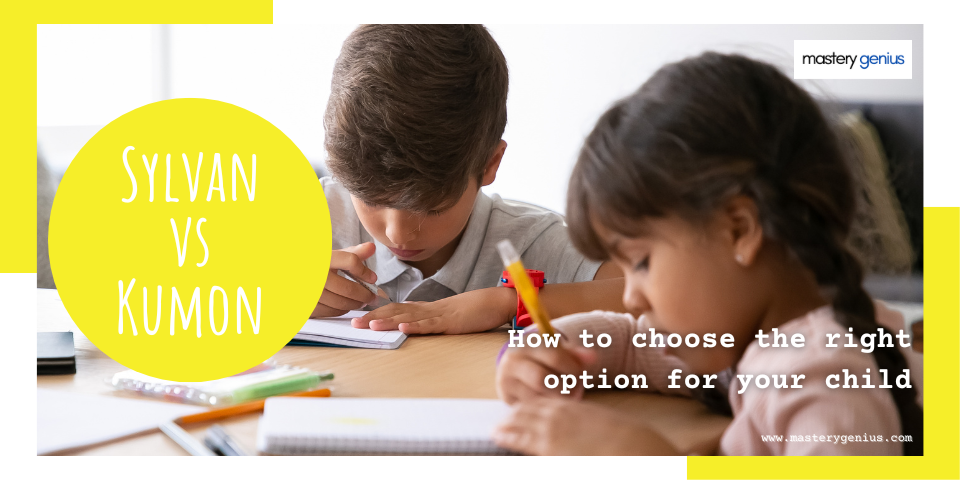Are you looking for an academic tutoring solution for your child? If that is the case, you are probably looking at two of the leading tutoring providers in the United States: Sylvan and Kumon. What are the major differences between these two providers, and which is better for your child? Let’s dive into the major similarities and differences as we explore Sylvan vs Kumon.

Consider Virtual Tutoring
Before we consider in-person tutoring solutions, we recommend that you explore online tutoring options like Mastery Genius. Mastery Genius provides students with an adaptive assessment and personalized curriculum. This means your child will study the exact topics they need to succeed. It removes the guesswork and focuses on making their practice time highly effective.
Virtual tutoring can be just as effective, if not more effective, than in-person tutoring. It is also more affordable, germ-free, and doesn’t require pick up and drop off. It is definitely worth your consideration!
Sylvan vs Kumon: Basic Overview
Both Sylvan and Kumon are in-person tutoring centers. Your child will attend in person 1-2 times per week to receive academic support. Both Kumon and Sylvan offer reading and math tutoring. Sylvan also offers a significant number of topics, all the way up through test prep for college entrance exams. Kumon is primarily focused on younger students, typically elementary school aged, whereas Sylvan focuses on all ages.
Both companies are franchised, which means each location is independently owned and operated with corporate oversight. What this means is that each location typically has a shared curriculum, but teacher quality and management can vary. Some centers are run by highly dedicated teacher-owners, while others are run by more passive owners who own tens of locations.

You might be surprised to learn that Kumon has 2,200 centers in the United States, but nearly 25,000 centers worldwide as of 2017. On the other hand, Sylvan Learning has about 750 locations total. So Kumon is much more of a worldwide phenomenon, but that is partly due to their model and the cost of starting a Kumon.
In terms of cost, Sylvan’s website says tutoring starts at $49 per hour, classes and camps start at $199, and ACT and SAT Prep classes start at $999. Many classes require a placement test as well, which can be an additional fee, as well as a registration fee. Of course, cost will vary significantly based on the number of students, specialization of the topic, and location.
Kumon’s pricing is much more straightforward. Kumon typically charges a monthly fee of $80-$150 per subject, with a no-fee assessment to begin. When you sign up for the subject and pay the monthly fee, your child is able to attend 1-2 times per week. There is a registration fee and a materials fee when joining Kumon.
The Sylvan Model
As mentioned previously, Sylvan takes a broad approach to tutoring, offering classes for all age groups and all subjects. A quick look at their K-12 programs page shows that they offer reading, math, advanced math, writing, homework help, study skills, test prep, and a variety of academic camps. Some locations even offer coding classes for kids, and a variety of other STEM offerings.

At Sylvan, students receive small group instruction, which is different from Kumon as we will explain below. A typical class at Sylvan has one teacher for every three students. As a result, the pricing for Sylvan is going to be significantly higher than a “class” based model like Kumon.
Sylvan strikes me as a shotgun approach to running a tutoring business. By serving all grades and subjects, I have trouble believing that there will be a specialty that sets their service apart. If you are the type of parent who doesn’t want to go out and find an independent tutor, you will likely find that Sylvan has a wide variety of staff who can help you. There will also be a proven curriculum that the teachers use. But if you are able to find a subject specialist on your own, you will likely save money and time by working directly with that person.
The Kumon Model
In Kumon, the focus is working with younger students (technically they do have a program for older kids, but it is not the traditional emphasis) with a focus on reading and math. Kumon for both reading and math is very worksheet based. For math, students work on developing number sense and math facts. For reading, students do exercises to increase their comprehension of a variety of text. You can see examples of their reading program and their math program on the Kumon website.

As I mentioned, Kumon is not focused on small group instruction, although depending on the center, your child may receive some small group help or accommodation. Typically, students are seated in a large room where there is one main administrator (generally the owner-operator) and a number of helpers (generally high school students). When students enter, they pick up their worksheet(s) for the day and spend 30 minutes working. Then when they wrap up, they have additional worksheets to do at home during the week.
As a former teacher, I will say that Kumon does get results for certain types of students. I have seen kids who really struggle with math go to Kumon and see improvement in their understanding of numbers and math operations. However, the math method is a lot of drilling, and doesn’t necessarily result in a deep understanding of problem solving.
Do Sylvan and Kumon work?
The truth is, if you and your child dedicate the time to any sort of tutoring program, whether online or in-person, you are likely to see improvement and growth. If you are trying to decide who wines in Sylvan vs Kumon, you should pick the program that is best for your child’s personality. If they are the type of child who can focus on the computer and you want to make fast noticeable progress, Mastery Genius might be the best choice. Does your child really struggle with numbers and making math make sense? Then I would recommend Kumon. However, if your child needs their hand held through the learning process, or they have attention issues, working with a one-on-one tutor or going the Sylvan route might be for you.


